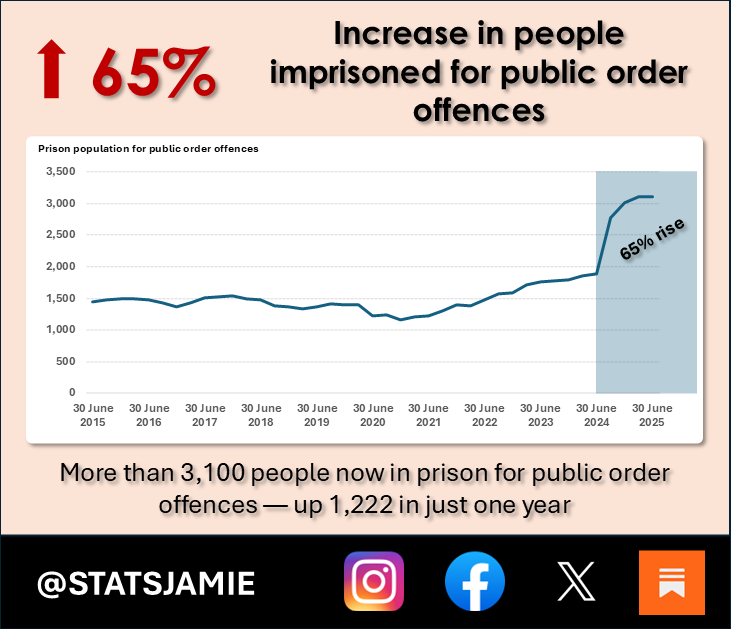Jail for Speech, Freedom for Dangerous Offenders
A 65% rise in public order prisoners. Early releases because jails are full. A Royal Marine taken to court over a social media post — acquitted in under an hour. Welcome to Britain under Keir Starmer.
Our prison system is breaking because successive governments failed to invest — even as the UK population surged. But it’s not just violent offenders or hardened criminals filling the cells. It’s people being jailed for what they say.
Take Lucy Connoly — charged under sweeping “public order” laws now being used to clamp down on speech, protest, and dissent.
And while ministers let offenders out because they’ve run out of room, they’re still creating a steady pipeline of new inmates — some of whom may not have committed any real crime at all.
Let’s break down what’s happening.
A 65% Surge in Public Order Prisoners
The numbers don’t lie.
Public order prisoners — those jailed for things like “offensive” speech, protest disruption, or causing alarm — have surged by 65% in the past year. That’s an increase of 1,222 people.
The spike began in summer 2024 — just as Keir Starmer entered Downing Street. But this wasn’t just about a change in government.
That summer saw riots in cities across the UK, from Southport to London and Manchester. Public anger erupted after a series of violent crimes, including a horrific stabbing in Southport. With tensions already high over border failures and rising crime, the protests quickly turned into chaos. Keir Starmer’s government responded with a hardline crackdown and sweeping public order charges — locking up hundreds in record time.
Starmer backed the crackdown, encouraging magistrates to impose prison time to “send a message.” Sentences that once would’ve meant fines or community service became jail terms — fuelling the surge in public order prisoners we see today.
Just weeks after the riots, Prime Minister Keir Starmer launched a new National Violent Disorder Programme, pledging to “stamp out” unrest and ramp up the use of tools like facial recognition technology. He called recent clashes “an assault on the rule of law” — not protest, not legitimate — but crime. The message was clear: the line between speech and criminality is getting blurrier, and the government is building an infrastructure to punish disruption, not just violence.
At the same time, Labour has overseen over 16,000 early releases to ease overcrowding. According to Ministry of Justice data, 16,231 prisoners were released between September and December 2024 under a temporary scheme that cut the minimum time served from 50% to 40%.
Among those released early was a man who went on to kill — a tragic case that shows the real risks of rushing justice.
So we’re locking up people for what they say — and letting out people who go on to commit violence.
What Exactly Is a Public Order Offence?
Most people hear “public order” and think of violent riots or mobs. But in practice, it can mean almost anything:
Peaceful protests that cause “disruption”
Holding signs that are “alarming”
Chanting slogans that upset people
Posting views on social media deemed “offensive”
These aren’t violent acts. They’re expressions of opinion.
But in the wrong hands, these laws become a blunt tool — used not to stop harm, but to silence dissent.
And right now, they’re in exactly the wrong hands.
Jamie Michael’s Story: Taken to Court Over a Social Media Post
Jamie Michael isn’t a household name. But his story shows where we are.
A former Royal Marine, Jamie posted a video after the Southport killings. He said Britain was “under attack” and criticised the government’s failure to control illegal immigration. He used strong language — emotional, angry — but he didn’t call for violence or hatred.
Still, he was charged with stirring racial hatred.
At trial, the jury took under an hour to find him not guilty. His lawyer summed it up: “These are not mad ideas.”
Jamie had the courage and resources to fight. Many others don’t.
How Many Are in Jail Just for What They Said?
That’s the uncomfortable question.
If Jamie had taken a plea deal — like so many others — he’d now be a convicted hate criminal.
How many others are in the same boat?
How many were told: “It’s easier if you just plead guilty”?
How many didn’t have the time, money or nerve to fight it?
How many are in prison not because they broke the law — but because they didn’t fight back?
This Isn’t About Public Safety — It’s About Control
Let’s not pretend this is about keeping people safe.
If it were, dangerous criminals wouldn’t be walking free because the prisons are full.
If it were, repeat offenders wouldn’t be let out early, only to kill again.
If that were the case, we wouldn’t be locking people up for social media posts while running out of space for actual criminals.
This isn’t justice. It’s politics. It’s power. And it’s about control — of what you say, what you think, and who’s allowed to speak.
Final Word: We’re Locking Up Opinions — And Letting Out Offenders
This is justice under Keir Starmer.
Free speech is under attack.
Thousands of dangerous criminals are being quietly released back onto the streets.
And a growing number of ordinary people — ex-soldiers, protestors, and working Brits — are being hauled before courts for what they say.
It’s time to ask: who’s really a threat to society?
Because right now, it’s not the ones in power being silenced. It’s you.
Jamie Jenkins - please subscribe


